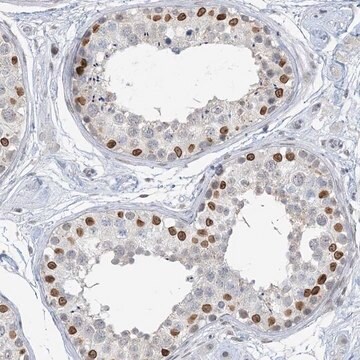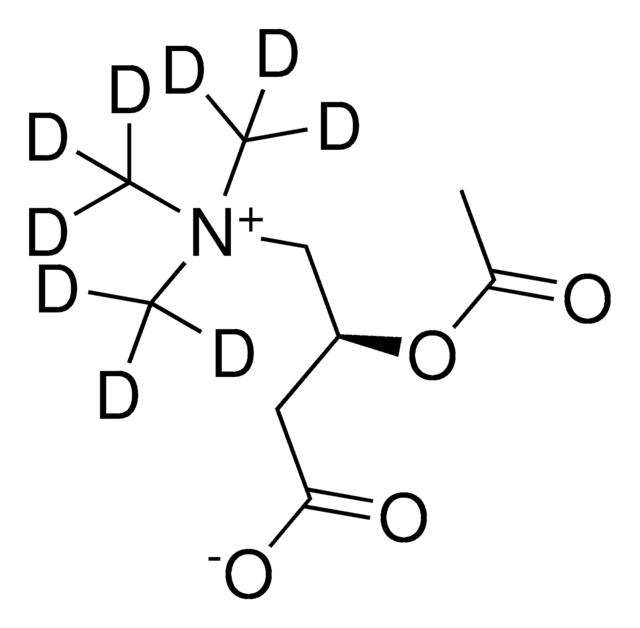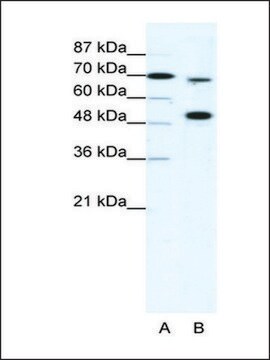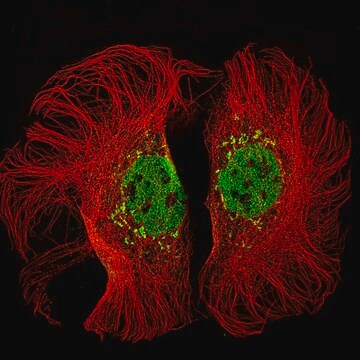ABE1867
Anti-MLL4 Antibody
from rabbit, purified by affinity chromatography
Sinonimo/i:
Histone-lysine N-methyltransferase 2D, ALL1-related protein, Lysine N-methyltransferase 2D, Myeloid/lymphoid or mixed-lineage leukemia protein 2
About This Item
Prodotti consigliati
Origine biologica
rabbit
Livello qualitativo
Forma dell’anticorpo
affinity isolated antibody
Tipo di anticorpo
primary antibodies
Clone
polyclonal
Purificato mediante
affinity chromatography
Reattività contro le specie
human, mouse
tecniche
ChIP: suitable (ChIP-seq)
western blot: suitable
N° accesso NCBI
N° accesso UniProt
Condizioni di spedizione
ambient
modifica post-traduzionali bersaglio
unmodified
Informazioni sul gene
human ... KMT2D(8085)
Descrizione generale
Specificità
Immunogeno
Applicazioni
Epigenetics & Nuclear Function
Chromatin Immunoprecipitation (ChIP) Analysis: A representative lot detected MLL4 (MLL2) occupancy on the PPAR 1, but not the PPAR 2, proximal promoter in MEFs, while MLL4 enrichment was found on PPARγ1, PPARγ2, and C/EBP promoters in differentiating murine brown preadipocytes (Cho, Y.W., et al. (2009). Cell Metab. 10(1):27-39).
ChIP-Sequencing (ChIP-seq) Analysis: A representative lot detected MLL4 MLL4 genomic enrichment sites in a cell type- and differentiation stage-specific manner (Lee, J.E., et al. (2013). Elife. 2:e01503).
Immunoprecipitation Analysis: A representative lot immunoprecipitated MLL3/MLL4 complex components (UTX, PTIP, RbBP5 and PA1) and C/EBPβ, but not Menin, from mouse brown preadipocyte nuclear extracts prepared at day 2 of adipogenesis (Lee, J.E., et al. (2013). Elife. 2:e01503).
Qualità
Western Blotting Analysis: A 1:5,000 dilution of this antibody detected 50 ng of recombinant human MLL4 fragment.
Descrizione del bersaglio
Stato fisico
Stoccaggio e stabilità
Altre note
Esclusione di responsabilità
Non trovi il prodotto giusto?
Prova il nostro Motore di ricerca dei prodotti.
Codice della classe di stoccaggio
12 - Non Combustible Liquids
Classe di pericolosità dell'acqua (WGK)
WGK 1
Certificati d'analisi (COA)
Cerca il Certificati d'analisi (COA) digitando il numero di lotto/batch corrispondente. I numeri di lotto o di batch sono stampati sull'etichetta dei prodotti dopo la parola ‘Lotto’ o ‘Batch’.
Possiedi già questo prodotto?
I documenti relativi ai prodotti acquistati recentemente sono disponibili nell’Archivio dei documenti.
Il team dei nostri ricercatori vanta grande esperienza in tutte le aree della ricerca quali Life Science, scienza dei materiali, sintesi chimica, cromatografia, discipline analitiche, ecc..
Contatta l'Assistenza Tecnica.








